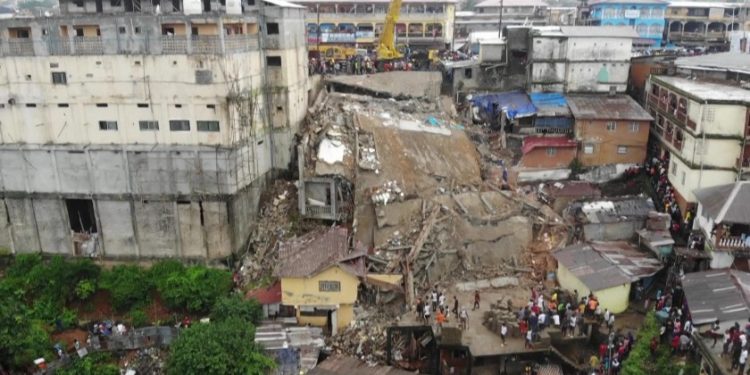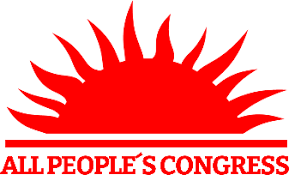The ongoing and escalating issue of poorly planned, ill-constructed and dangerously located structures in Freetown has become an alarming crisis. With tragic building collapses claiming lives and destroying property in 2024, it is crucial to scrutinize the roles of the various responsible sectors: the Ministry of Lands Housing and Country Planning, the Ministry of Environment and Climate Change, the Ministry of Works and Public Assets, the Municipality Management of Freetown City Council (FCC), the Sierra Leone Roads Authority (SLRA), and the Environmental Protection Agency (EPA). These agencies are pivotal in land management, urban planning, construction regulation, and environmental oversight. However, the persistent and worsening structural failures in Freetown point directly to systemic failures in sectoral leaderships and coordination.
The Ministry of Lands is tasked with overseeing land allocation and ensuring that all land use adheres to national and local zoning laws. However, it is apparent that the rampant mismanagement and corruption within the line Ministry have led to the improper allocation of land for construction, particularly in areas prone to environmental hazards such as flooding and landslides.
In Freetown, unregulated and informal settlements have mushroomed in hazard-prone areas, such as steep hillsides and floodplains. Many of these structures are erected without proper permits, often with the knowledge—or sometimes even the assistance—of corrupt officials within the Ministry. The consequences are dire: when heavy rains hit, these precariously built structures collapse, burying residents and property. The 2024 collapse of buildings in areas like Kaningo and Culvert, which claimed numerous lives, are stark reminders of the Ministry’s negligence in enforcing proper land-use policies.
The Ministry of Works, responsible for regulating construction standards and ensuring that buildings are structurally sound, has been notoriously ineffective in its duties. The frequent collapse of structures indicates a glaring lack of proper building inspections and adherence to safety regulations. Contractors and builders continue to operate with impunity, constructing substandard buildings using inferior materials, without facing significant oversight or consequences.
The collapse of a multi-story building in Goderich in early 2024, which killed several people, underscores the Ministry’s failure to enforce building codes. Investigations revealed that the building did not meet the required safety standards and was erected without following proper engineering procedures. Yet, this case is only one of many, revealing a pattern of negligence within the Ministry of Works. Despite numerous building collapses over the years, there has been no substantial reform or increased enforcement to curb these incidents.
The Freetown City Council, which is tasked with local governance, including the enforcement of building regulations and land-use planning within the city, has also failed miserably in its responsibilities. Under its watch, unplanned urban sprawl has continued unchecked, with informal settlements expanding into dangerous zones.
The FCC’s failure to control illegal constructions and enforce city planning regulations has contributed significantly to the dangerous living conditions in Freetown. For instance, the hillside areas of Looking Town, in the East End of Freetown and Hill Station have seen a surge in unregulated constructions, where buildings are erected without considering the topography or the risk of landslides. These areas have experienced multiple building collapses, and yet the FCC’s regulatory grip on the city remains weak. The disconnect between the FCC’s responsibilities and the growing urban chaos is a testament to poor leadership, mismanagement, and a lack of political will to protect the city’s residents.
The Sierra Leone Roads Authority (SLRA), responsible for road construction and maintenance, plays an indirect but crucial role in ensuring the stability of structures adjacent to road networks. Poorly designed road projects often lead to erosion, flooding, and destabilization of nearby buildings. In addition, road constructions that do not adhere to proper drainage and environmental safety standards further contribute to the deterioration of nearby structures.
One striking example is the 2024 collapse of buildings along Bai Bureh Road in the Kissy area, following road works that disrupted the stability of nearby houses. The SLRA’s lack of coordination with the Ministry of Works and EPA has contributed to such incidents, as road construction in Freetown often takes place without sufficient planning regarding the impact on surrounding areas.
The EPA, which is supposed to ensure that all developments in Freetown adhere to environmental safety guidelines, has failed to prevent construction in ecologically sensitive areas. The relentless deforestation in the hills surrounding Freetown, often to make way for illegal housing developments, has led to severe erosion, landslides, and flooding—disasters that could have been mitigated with proper environmental oversight.
In 2024, when torrential rains led to a series of building collapses in Regent and Leicester, the EPA’s failure to enforce regulations became all too evident. The Agency has repeatedly issued warnings about the dangers of constructing homes on hillsides without proper terracing or drainage systems, yet these warnings are seldom acted upon. The EPA’s inability to halt illegal construction and enforce environmental laws is a direct contributor to the loss of life and property in Freetown.
The collapse of buildings in Kaningo, Goderich, and Kissy in 2024 has shocked the nation, but these incidents are not isolated. In previous years, Freetown has seen similar tragedies, such as the devastating mudslide in Regent in 2017, which killed hundreds of people. In each of these cases, the same patterns of neglect, corruption, and lack of oversight are evident.
These collapses are not natural disasters—they are man-made catastrophes, resulting from the systematic failure of the very institutions tasked with protecting citizens from such dangers. The Ministry of Lands continues to allocate land in unsafe areas; the Ministry of Works fails to enforce building standards; the FCC is unable or unwilling to regulate the city’s rapid and unplanned expansion; the SLRA disrupts local ecologies with poorly planned road projects; and the EPA stands by as construction takes place in environmentally vulnerable areas.
The leadership of these respective institutions must be held accountable for their roles in allowing such tragedies to occur. The Ministry of Lands must be reformed to eradicate corruption and ensure that land allocation follows strict environmental and safety guidelines. The Ministry of Works needs to step up its enforcement of building codes, ensuring that all structures meet international safety standards. The FCC must take urban planning seriously, regulating construction and preventing the development of informal settlements in high-risk areas. The SLRA must ensure that its projects do not destabilize nearby structures, and the EPA must enforce environmental regulations with greater rigor to prevent further disasters.
Without immediate reforms and accountability, Freetown will continue to face preventable building collapses, claiming more lives and further degrading the city’s already fragile infrastructure. The tragedies of 2024 and even prior, should serve as a wake-up call to Sierra Leone’s leadership, highlighting the urgent need for action in protecting citizens from the dangers of poorly managed urban development. It is time for the respective leaderships of these institutions to stop passing the blame and take responsibility for the safety and future of Freetown.













